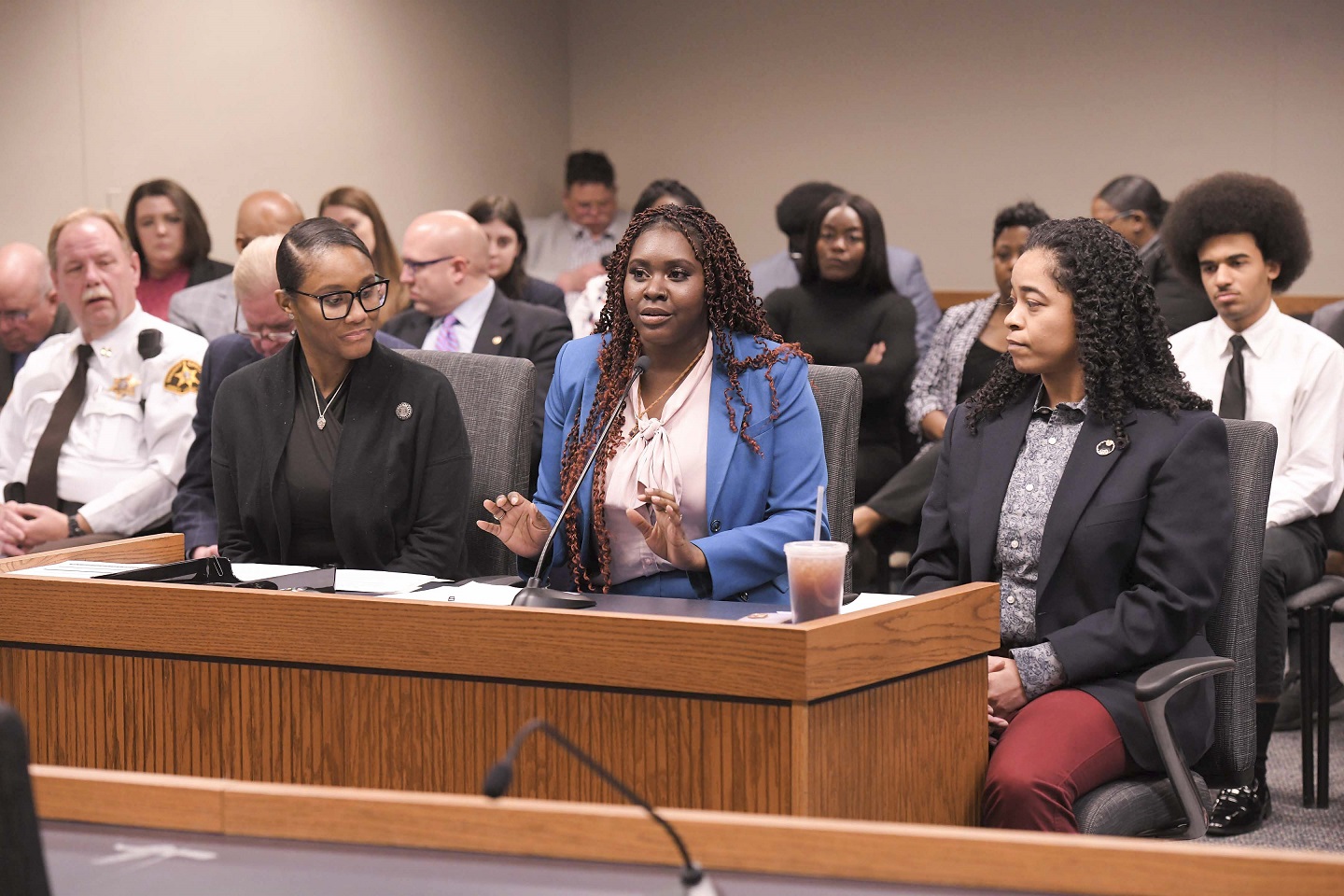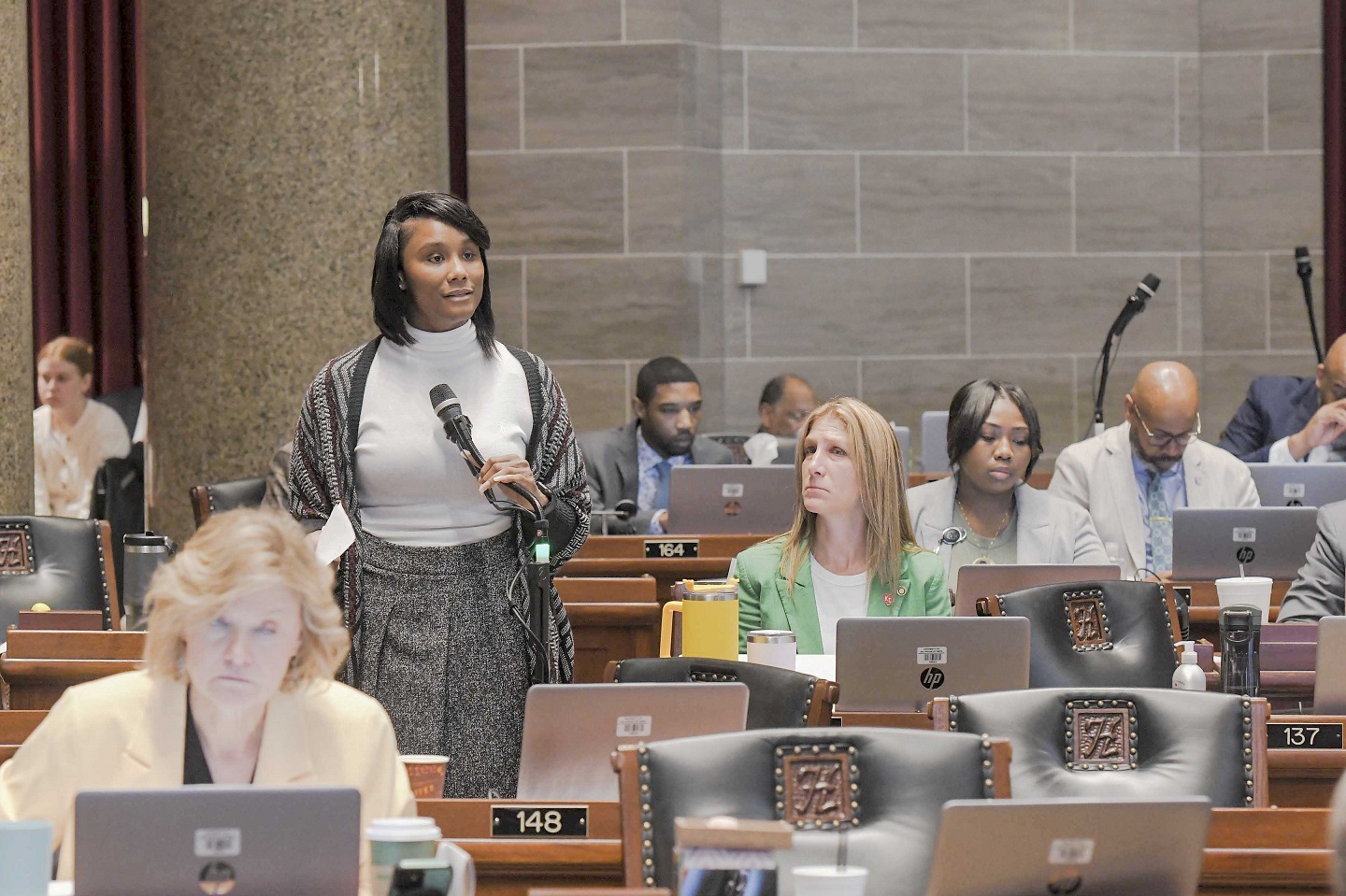The 2024 session was the last in the Missouri House for Representative Ashley Bland Manlove (D-Kansas City), due to term limits. Representative Jamie Johnson (D-Kansas City) offered this sendoff as the session drew to a close:
Tag: Ashley Bland Manlove
House votes to bar hair-based discrimination with passage of ‘CROWN Act’
The House has voted to bar discrimination based on how people style their hair, specifically natural hair textures and cultural styles.

For several years now, legislators have been asked to pass the “Missouri Creating a Respectful and Open World for Natural Hair,” or “Missouri CROWN Act.” House Bills 1900, 1591, & 2515 would specify that no person may be discriminated against based on hair texture or protective hairstyle if that style or texture is commonly associated with a particular race or origin. The measure applies to any educational institution that receives state funding.
It was carried on the House Floor by Representative Raychel Proudie (D-Ferguson), whose bill was combined with those from Representatives LaKeySha Bosley (D-St. Louis City) and Ashley Bland Manlove (D-Kansas City).
“Every freedom- and liberty-loving patriot in Missouri should be in favor of this bill, especially those of us who believe that children should be able to exist the way in which God created them,” Proudie said. “Simply put, that’s what this does. Any constitutional, tax-paying citizen of Missouri should agree to this bill because all students and their parents should have access to the things which their tax dollars go to sustain.”
Proudie is a teacher as well as a school counselor certified in three states. “Students can’t learn when they’re not in class learning. As a teacher, I can say, and have said, we must be much more interested in what we are putting in a student’s head than what’s going out of it. If we’re distracted by someone’s hair, then maybe that’s something we need to take up with a physician, but it’s not the child’s problem,” Proudie told her colleagues.
Each year that the legislation has been considered, legislators have heard testimony, especially from people of color, who said they have faced discrimination based on their hairstyles. Again this year, Missourians told the House Committee on Urban Issues that their hairstyles have been politicized; they have been discriminated against in job interviews and classrooms; and they have been made to feel like they cannot style their hair how they choose.
The proposal has evolved over the years. The version passed on Wednesday by the House includes exceptions for the use of things like hairnets or coverings for safety purposes. This was a change pursued by Representative Scott Cupps (R-Shell Knob), whose background includes time as an agricultural education teacher.
He says in that curriculum, in particular, students need protection.
He said changes like that could very well lead other states to mirror versions of this legislation off of this.
More bipartisan support came from Imperial Republican Renee Reuter, who said, “I do have naturally curly hair, and I promised people in my district before I came back from the interim that I was going to represent the curly-haired girls when I was here, and I’m so proud that this bill is here and I support it.”
Echoing Proudie, Reuter added, “Women and men need to be able to just be who they are and express their hair the way that they are given it from God.”
The House voted 144-0 to send the legislation to the Senate, where a similar bill was recently passed out of a committee.
House votes to increase state efforts against veteran suicide
The House has voted to improve the state’s efforts to prevent suicide among its veteran population.

Representatives voted 156-0 for House Bill 132, which directs the Missouri Veterans Commission to work with the Department of Mental Health to come up with recommendations on how Missouri can prevent veteran suicide. It would require the Commission to report annually, beginning June 30, 2024, on new recommendations and on the implementation and effectiveness of the state’s efforts.
The bill is sponsored by Jefferson City Republican Dave Griffith, a U.S. Army Veteran who served with the 8th Special Forces Group as a Green Beret. He has spent much of his career in the House dealing with veterans’ issues, and with ways to stem suicide not only among current and former service members but in the population in general.
Griffith speaks often of the social media campaign #22, and his personal goal of decreasing or eliminating what that number represents.

Though he and others in the legislature and state government have been talking about these issues for years and developing related programs, Griffith said Missouri has a long way to go. Representative Ashley Bland Manlove (D-Kansas City), who has served in the Missouri National Guard, agreed.
“I think the biggest population that we should be talking about is the one percent of American population that raises their right hand for this country,” continued Bland Manlove. “The best way that we can thank our veterans for their dedication and work to this country is by taking care of them.”
Rogersville Republican Darin Chappell (R) has a great deal of experience with the issues faced by military members and their families, as he is a veteran of the Navy and the Army Reserves and has many service members in his family.
Before casting their votes for the measure, legislators reflected about their own personal experiences. St. Clair Republican Brad Banderman solemnly told his colleagues, “About two years ago my little sister laid down on the grave of my older brother that shot himself in 1990 and killed herself. Anything that we can do as a legislature, as a body, as individuals, to help prevent the suicide of our veterans, I’m in full support of.”

Missouri as of 2020 had the 14th highest suicide rate in the U.S., with about 1,125 people having died by suicide in that year. The rate among veterans is approximately 1.5 higher than in the rest of the population, and experts are telling legislators they fear that suicide rates are going to increase.
“I think we need to do better and I think this is a good start,” said Representative Robert Sauls (D-Independence).
The same bill passed out of the House last year but did not come to a final vote in the Senate.
Anyone in need of help for themselves or someone else for a mental health, substance abuse, or suicide crisis is encouraged to call 988.
House bill would increase penalties for ‘swatting’
The House has voted to increase the penalties for deliberately reporting someone to law enforcement with the intent or hurting, embarrassing, or intimidating them; a practice commonly referred to as “swatting.”

Under House Bill 1704 a person would be guilty of making a false report if they intentionally make, or causes to be made to any enforcement organization, a false report that could cause bodily harm as a result of the emergency response.
“The bill hinges on the statement that it is with reckless disregard of causing bodily harm to any person as a direct result of an emergency response,” said bill sponsor Lane Roberts (R-Joplin). “It’s an effort to keep people from weaponizing the public safety system to harm other people; sometimes physically, sometimes by reputation or intimidation.”
“This also deals with the use of the system to humiliate, embarrass, or have people forcibly removed from premises, and this is often aimed at minorities, aimed at religious differences, sexual orientation … recent news has been replete with that kind of conduct,” said Roberts. “This bill prohibits that kind of use of public safety to harm others, to harm their reputation, to harm them physically, or otherwise damage an individual.”
Those who make false reports that result in a person being killed or seriously hurt could be charged with a class-B felony, punishable by 5 to 15 years in prison. Otherwise, false reports of a felony crime would be a class-C felony (up to 7 years in prison) and false reports of a misdemeanor would be a class-B misdemeanor (up to six months in jail and a fine of up to $1,000).
Roberts and other legislators have discussed in recent years how incidents of “swatting” seem to have increased, and in some cases those have resulted in deaths and serious injuries. Roberts’ legislation is the latest attempt to address that.
His proposal was sent to the Senate with unanimous bipartisan support, 142-0. Democrats contributed to the language of HB 1704, and Representative Ashley Bland Manlove (D-Kansas City) spoke in support of it. She said she remembers a recent “swatting” incident that happened just across the state line from her district, in Kansas.
“Somebody he was on [a] video game with in California was apparently mad that they had lost the game and used an app to deploy SWAT to the man in Overland Park’s house saying, ‘He’s got somebody in the house and they’ve got hostages,’ so SWAT comes in hot immediately. Unfortunately the young man was a black man,” said Bland Manlove. “I’ve also heard of this being used, as [Representative Roberts] said, in domestic disputes. Somebody’s mad that they don’t have the kids or they have to pay child support so then they constantly use the police, filing false reports against the other partner.”
The bill was also the product of bipartisan cooperation, with the inclusion of changes authored by Representative Robert Sauls (D-Kansas City).
In addition to possible incarceration and fines, violations of the language of HB 1704 could result in civil penalties.
HB 1704 was sent to the Senate with two full weeks remaining in the legislative session.
House votes to protect Task Force 1 members’ jobs
When Missouri Task Force 1 was deployed to Louisiana last August in response to Hurricane Ida and in December after tornadoes hit Kentucky team members knew that when they came home they would be able to return to their jobs. When they were deployed to Joplin after an EF-5 tornado devastated that community, they couldn’t be as certain. The Missouri House has voted to change that.

When Task Force 1 is deployed out-of-state its members are protected by the federal Uniformed Services Employment and Reemployment Rights Act (USERRA). Deployments in-state aren’t covered by such a law. House Bill 2193 would change Missouri law to mirror USERRA. This would mean the Task Force’s more than 200 volunteers’ jobs would be protected no matter where they go.
“It just makes their employment rights the same if they’re deployed within the State of Missouri or outside the State of Missouri,” said bill sponsor Cheri Toalson Reisch (R-Hallsville).
“They have those rights currently in federal law but not in state law,” Boone County Fire District Chief Scott Olsen, who heads up Task Force 1, told the House Committee on Public Safety. “When we deploy to state disasters we are deployed as a state asset, not as a federal asset. You cannot deploy as a federal asset in your own state, so we would like to have the same USERRA protections … that our members receive for federal deployments.”
Last year Toalson Reisch filed a similar proposal that stalled in the Senate after clearing the House 153-0. This year’s proposal has similar broad support. Kansas City Democrat Ashley Bland Manlove said in support of HB 2193, “Me being in the National Guard, I heard about guys – and I know this is Task Force 1 but this will make them like the National Guard to where you can’t get fired for a deployment, basically. That is a thing that has happened.”
The House voted 150-0 to send HB 2193 to the Senate.
Task Force 1 is one of 28 search and rescue teams of its kind and is the only one in Missouri. Its volunteers come from throughout Missouri.
